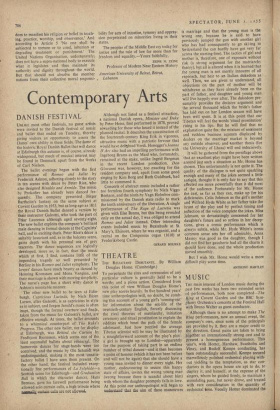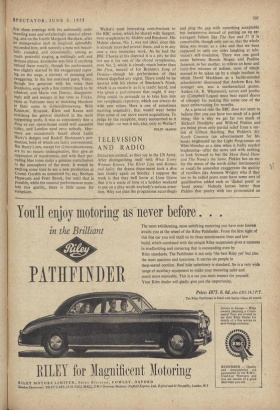MUSIC
THE main interest of London music during the past few weeks has been two extended series of performances, both now completed—The Ring at Covent Garden and the BBC Sym- phony Orchestra's concerts at the Festival Hall with Bruno Walter as guest conductor.
Although there is no attempt to make The Ring performances, now an annual event, the company's own, since none of the principals are provided by it, they are a major credit to the direction. Great pains are taken to bring together an internationally strong cast and to present a homogeneous performance. This year's, with Hotter,. Harshaw, Svanholm and Vinay, and Rudolf Kempe conducting, has been outstandingly successful. Kempe secured marvellously polished orchestral playing with- out yielding to the temptation, as star con- ductors in the opera house are apt to do, to display it, and himself, at the expense of the singers, Whom he guided firmly, to maintain a stimulating pace, but never drove, and treated with rare consideration in the quantity of orchestral tone. Vocally Hotter dominated the first three evenings with his unforccdly com- M. anding tone and unfalteringly musical phras- ing, and on the fourth Margaret Harshaw, after an unimpressive start in Siegfried, splendidly succeeded him, with scarcely a note not beauti- fully rounded, and occasionally, among so much powerful singing, a meltingly soft and delicate phrase. Svanholm was little if anything behind them vocally, though his performance was slightly marred by his exaggerated caper- ing on the stage, a travesty of prancing and swaggering.• In the less sustained parts, Vinay, though less generous with his voice than Svanholm, sang with a fine control much to be admired, and Maria von Ilosvay, disappoint- ingly stiff and meagre in her tone as Fricka, Fame as Valtraute near to matching Harshaw in their scene in Geitterdlimmerung. With Konetzni, Rysanek, Klein and Kraus well matching the general standard in the main supporting parts, it was as consistently fine a Ring as any opera-house could well assemble today, and London need envy nobody. Mur- murs are occasionally heard about Leslie Hurry's designs and Rudolf Hartmann's pro- duction, both of which are fairly conventional. But Hurry's sets, except for Gotterdammerung, are by no means unimaginative, they give an impression of massiveness, and with their per- vading blue tones make a genuine contribution to the atmosphere of the work. It would be exciting some time to see a new production at Covent Garden as conceived by, say, Barbara Hepworth and Peter Brook, but until that is Possible, while the musical performances main- tain this quality, there is little cause for complaint. Walter's most Interesting contributions to the BBC series, which he shared with Sargent, were symphonies by Mahler and Bruckner. His Mahler choice, No. 1, was not ideal, since this is already recorded several times, and is in any case a very immature work. As he had the BBC Chorus at his disposal it is a pity he did not use it for one of the choral symphonies, even No. 2, which is already much better than the First, instead of for Brahms's Song of Destiny—though his performance of that almost dispelled any regret. There could be no quarrel with his choice of Bruckner's Ninth, which is as masterly as it is rarely heard, and was 'given a performance that ought, if any- thing could, to persuade us to take him into our symphonic repertory, which can always do with new voices. Here is one of sometimes startling originality, that would wear better than some of our more recent acquisitions. To judge by the reception, many succumbed to it that night—or was it not, alas, only to Walter?



































 Previous page
Previous page